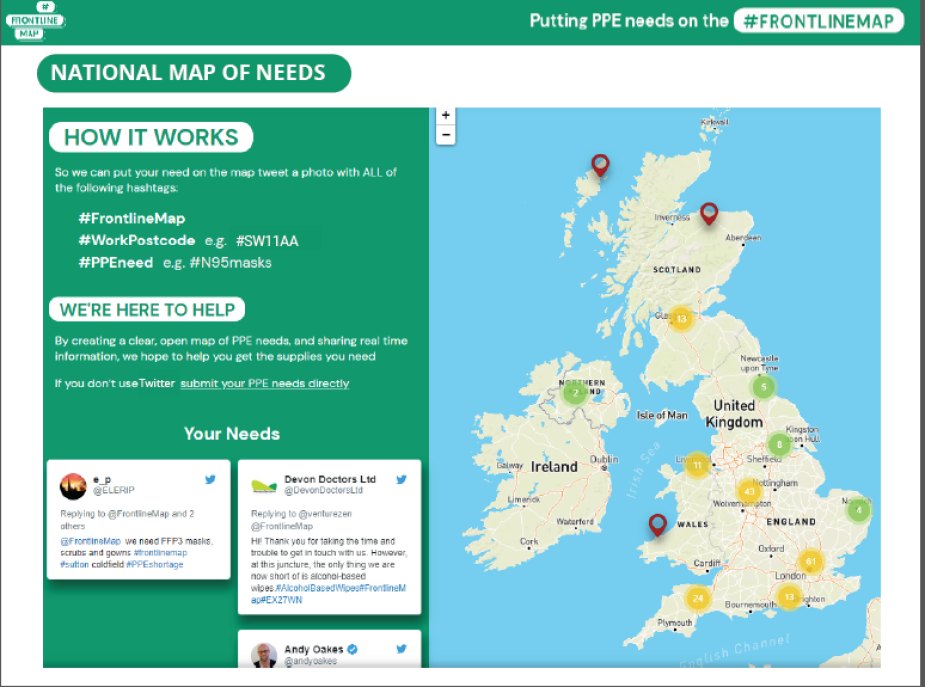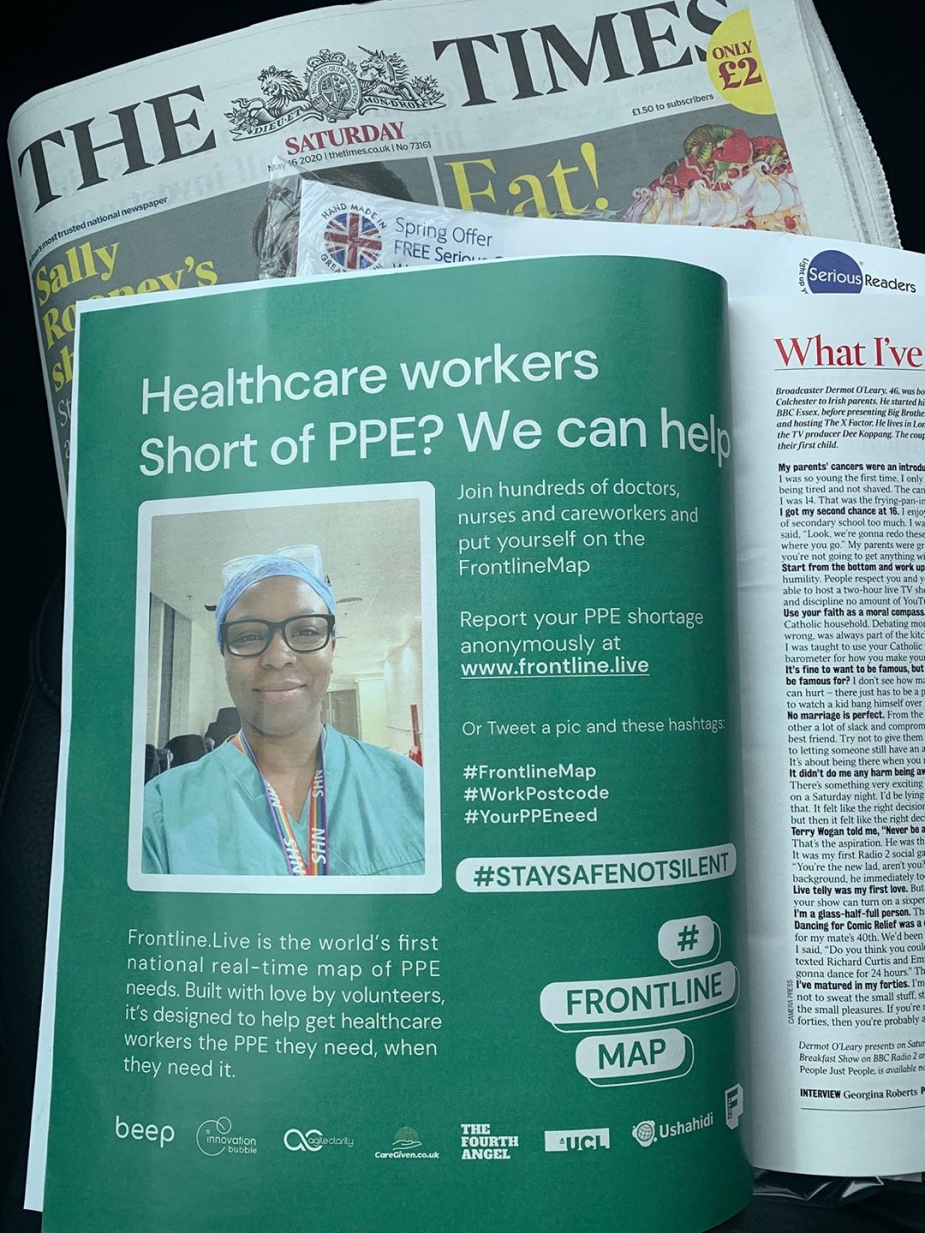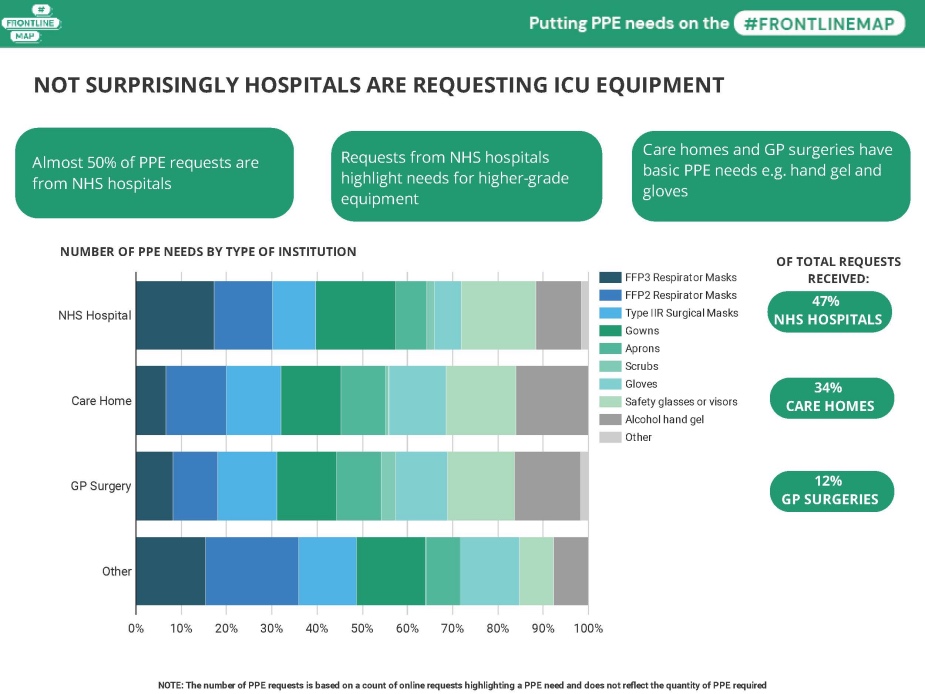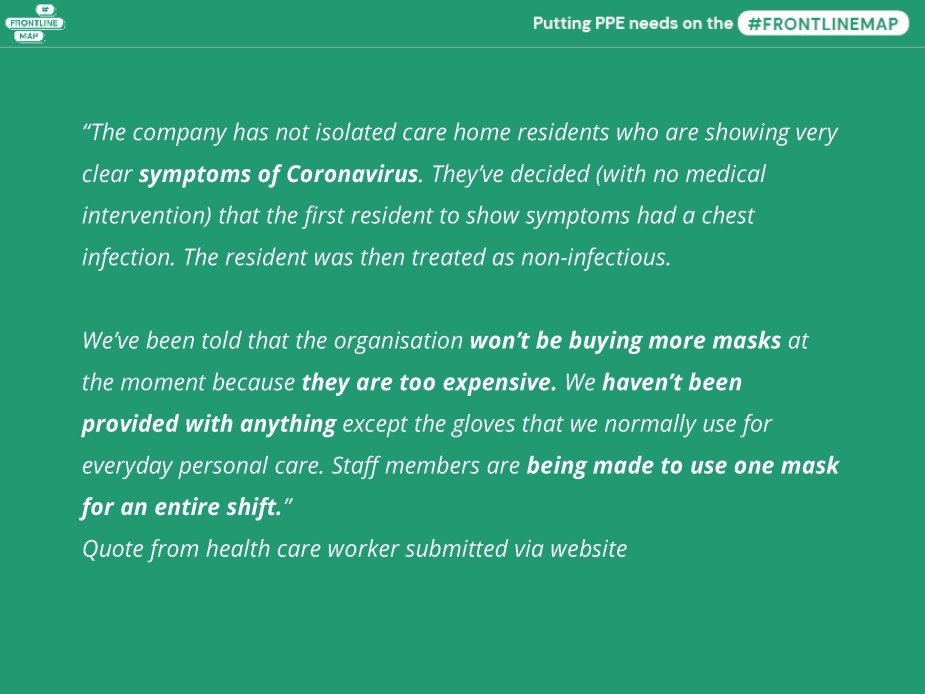
When NHS Workers Were Fighting Covid-19 Without PPE, a Gang of Digital Pioneers Came to Their Aid

“I keep saying it's like the little ships of Dunkirk on steroids,” says Katz Kiely, fondly, of the ragtag group of expert technologists, creatives, media platforms and unions she’s been working with throughout Covid-19 to ensure that NHS workers and carers got the protective clothing and equipment they desperately needed. Since lockdown began, she’s worked hard with a team of volunteers to create Frontline.Live, an innovative, decentralised platform that’s been helping to get PPE to people working at hospitals and medical facilities that found themselves unprepared for a pandemic.
One of the UK’s biggest scandals of the pandemic came near the beginning of lockdown in March. As cases and deaths began to rise rapidly, it soon became apparent that NHS workers and carers on the frontline were being forced to work with insufficient PPE – masks, gloves, visors, gowns, boots. Stodgy, dodgy centralised procurement was stopping workers getting their hands on the kit they needed to keep them safe as they treated patients with this unknown, virulent pathogen.
At the same time, there were plenty of people and organisations out there ready and able to help. Whether massive drinks brands like Brewdog or fashion houses like Burberry turning their supply chains around to create sanitiser and gowns, or enterprising individuals with 3D printers, schools with stacks of unused goggles in their science department store cupboards or village sewing circles, people wanted to do there bit. The problem was the gaping chasm between those who needed PPE and those who had it. What they needed was a bridge – or even better, hundreds of bridges.
Enter Frontline. It’s a decentralised platform that connects those in need of PPE with those companies and communities that make it. It’s simple to use – NHS workers could simply Tweet their needs, tagging #frontlinemap, detailing what equipment they’re lacking and the postcode of their workplace. And from there, the organisations that can help out.

Katz is CEO of beep and an expert in open-innovation and culture change. She has supported some of the biggest organisations in the world through digital transformation. She was triggered to act following a conversation with a friend of hers who was a nurse. As Katz talked about her reluctance to venture out, to visit the supermarket, her friend casually returned that she had no choice but to go into work and that they didn’t have any masks for her.
“That's inhumane. So that was when I dived in. It was the fact that actually in the 21st century, in the UK, in the developed world we shouldn't be in a situation where people are having to go into work feeling unsafe,” says Katz. “It's untenable, it's unacceptable.”
Katz’s first step was to talk to a friend from the Centre of Advanced Spatial Analysis. She had the idea of creating a digital map that could be populated by geolocated Twitter requests for PPE, so everyone could see what was needed where.
They had a good old geek-out session, but Katz wasn’t sure if the idea was possible in the time frame, especially with no available funds. By midnight that day, he had already gathered a band of developers who wanted to help. Agencies like Fourth Angel and Fifth jumped in and Katz put the call out on social media. Soon she had gathered 40 digital professionals ready to help build, run and get the word out about a decentralised platform that would get PPE requests from frontline health care workers. Agile Clarity’s Jen Myatt and Ben Cameron-Smith helped lead the tech team to develop the platform.
For the platform to do any good, it needed to reach NHS workers and it needed to go wide. And that meant storytellers. Thankfully, one of the people who showed up on the first volunteer Zoom call was Bo Hellberg, the prolific creative who has been ECD at HeyHuman, Edelman and Dyson.
The ambition to create a platform that would make a substantive, real world difference really excited Bo and inspired him to join Katz and her band. “So in the traditional world I would probably have, and I have to confess this, gone off and said, ‘Hey guys, we’re gonna do some awareness! Let’s tell people about nurses! Let’s make some advertising films’, and then make people aware that there’s no PPE and left it at that,” Bo chuckles, self-deprecatingly. “There have been a few things like that going on and it’s not wrong,, but what’s cool about Frontline is, working with other volunteer organisations like Caregiven, we are not just dong the comms, but making real positive change happen. You can do something physical, tangible that makes a difference.”
Bo and the team had quite a challenge ahead of them. The brief was urgent and functional – ultimately it had to inform NHS workers and carers of the platform and easy-to-use hashtag. But with 1.3m people employed by the NHS, that was a lot of people to reach with zero money. Moreover, as NHS trusts, managers and government bodies tried frantically to shut down whistle blowers highlighting the lack of PPE, the Frontline team couldn’t go directly into hospitals and care homes to share posters or flyers.

From a media perspective, they found businesses that were keen to jump in. The partnership with Fifth gave them access to News International . The Times and The Sun fully supported the project. The Times gave them a full page spread in prime position. Ocean Outdoor, working with Voodooh, offered space in huge Digital OOH billboards across the UK. Those big platforms helped reach a broad audience, not just NHS workers but their friends and families, who would be personally invested in sharing what they’d seen. When it came to social media, with no budget the team couldn’t use the sophisticated targeting tools they would ordinarily use. Twitter, as the main channel, has worked well and LinkedIn too, with its many, active professional groups. Surprisingly some of the biggest social media platforms declined the chance to help, citing the project as too political, though one did jump onboard wholeheartedly.
“Snapchat was really good, actually,’ recalls Bo. “They completely did it for us. The General Manager basically said ‘100% yes, whatever you need to make this work. We’ll help in whatever way we can’.” Snapchat ran a two week national campaign for Frontline.Live.
The message has been tweaked and refined in order to ‘play the algorithms’ and reach the right people in the right way. The initial storytelling push was all about the general lack of PPE in the NHS, The face of the first campaign is a colorectal surgeon – someone senior in their career and with enough clout to speak out loud and proud.
But on realising that 87% of requests were from people who chose to remain anonymous. They shifted to a key message of ‘Stay Safe, Not Silent’.
Trade union Unite in Health was another partnership that really helped with credibility and will getting the word out They could see their members struggling to work safely and were willing to back this new platform.
“I mean hats off to Unite in Health for jumping in,” says Katz. “And that was not an easy journey because obviously they need to be very protective, but hats off to them for understanding the power of what we've done. And that to me is what unions should be in the future. They should be all about empowering the members and getting out of the way.”

Their stamp of approval meant a lot, explains Bo. “I mean they carry a lot of clout, right?” he says. “So even though it's bureaucratic and staid, it is trusted. If you work, you do feel protected… I guess with Frontline, the fact that there's no money involved, like anywhere in any way, also means that we don't stand to gain from doing this. We are just all trying to do the right thing.”
All that collaboration and volunteered work and media space has really helped Frontline to make a real difference. Since launch, they’ve helped facilitate 1,300 requests, sending hundreds of thousands of pieces of PPE across the country. The site is still active, and if a second wave materialises, it is ready to use.
Looking at everything that Frontline has achieved, the platform is a fascinating case study of decentralisation. Katz had the initial idea and has worked hard to get the platform up and running, but the group of volunteers became pretty self-organising. And that’s also reflected in the nature of the platform itself – there’s no central logistics hub gathering up PPE resources and parcelling them out. “It's quite holocratic, right? Which means that it's self-organizing amoeba of stuff happening, which means that there is an element of chaos, but it also got a lot of autonomy and people just taking action,” reflects Bo.
Looking forward, the team is braced for any possible resurgence in coming months. The plan is to create space for NHS workers share their experiences so that the issue remains at the forefront of people’s minds and that word of the platform can continue to spread to reach those who need it. They’re also keen to welcome in any communicators, storytellers and media people to get involved – as lockdown has dragged on and the country has entered a weird in between phase and focus in the media has shifted, there might be a feeling that it’s an issue that’s been and gone, but there are still those working in critical conditions who still need safety equipment.

But there’s more to this project too. Not only is it a great example of how people have rallied and found ingenious solutions during a global catastrophe – it’s a model that can be replicated quickly in response to any future shocks. The open source platform, toolkit and digital playbook lives on Github, free for anyone to pick up in response to any future pandemic or natural disaster. There has been interest from the Nordics region and the US – in fact one of the project managers who helped out was from the States – so this is an approach that has application beyond the UK, beyond Covid-19 and beyond PPE.
“Our dream is that if there's a crisis anywhere in the world, and there's a bunch of volunteers who go, ‘we want to be able to empower people on the frontline to make sure they are safe, how do we make it happen?’ they can,” says Katz. “It's like our communal gift to the world.”
Access the toolkit and digital playbook here.













